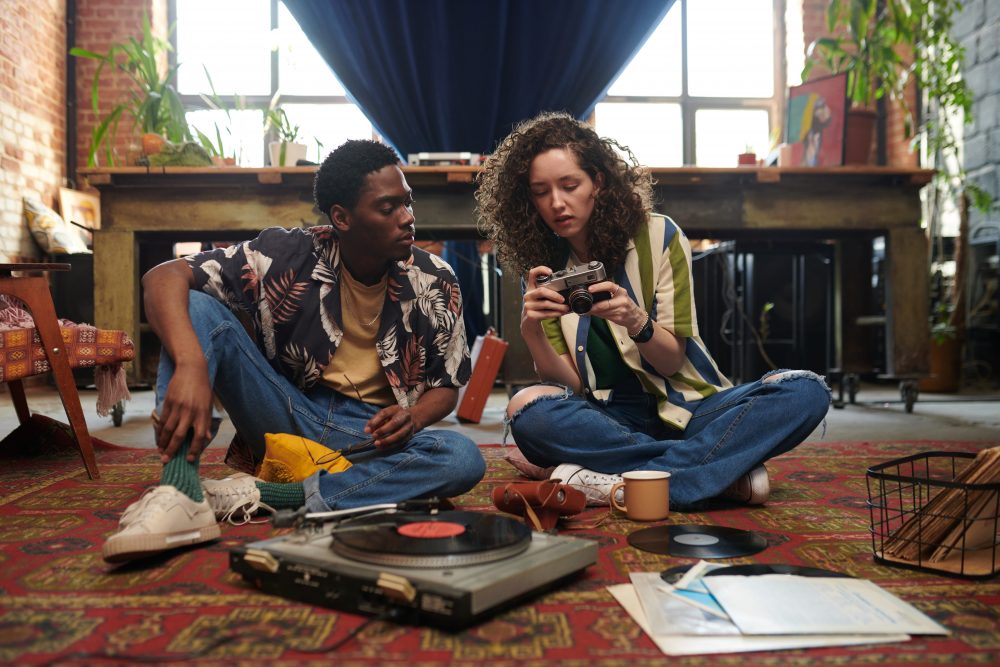Helping brands keep a pulse on how people are feeling and engaging in the time of COVID-19, social injustice, and political and economic turmoil.
Anywhere but Here: Gen Z Copes Through Escapism
Navigating early adulthood is complicated enough, but with the added complexities of the pandemic, inflation, political turmoil, and recent talk of a recession, it’s no surprise Gen Z is stressed. In January, a McKinsey study revealed that Gen Z has the most negative outlook on life compared to other generations – one in four Gen Z feel emotionally distressed, twice as much as Millennials or Gen X. As a result, this generation has armed itself with a toolkit of coping mechanisms – and one notable strategy is through time travel.
Ok, they’re not literally time traveling, but Gen Z is clicking out of current dystopian realities by escaping into the past. Their ticket out? Two almost opposing strategies – nostalgia (imagining a best case, simpler time) and horror (imagining the worst case, making the present more manageable). The latest season 4 volume 1 of the massive hit Stranger Things manages to combine the two. Set in the 1980s, the series plays up nostalgic pop culture elements like the Kate Bush track “Running Up That Hill” alongside dark, fear-inducing plot points as the series’ teenage protagonists navigate their identities, grief, trauma, bullies, and the grasp of Vecna, the season’s villain. Watching this group of young friends work through personal horrors seems to have struck an emotional chord with Gen Z viewers, contributing to volume one’s status as Netflix’s most-watched English series of all time. Nostalgia and horror offer Gen Z a crucial combination of therapy, entertainment, and release.
Looking to the Past for Coping and Connection
Nostalgia isn’t new, but Gen Z employs it as an essential coping mechanism. Arguably the first generation to have lived their entire lives with the Internet, Gen Z has grown accustomed to having unlimited access to imagery from the past. And with the pandemic relegating many crucial in-person adolescent and early adult experiences to their screens, pre-Internet eras have a special appeal. When online is all you’ve known, pandemic and inflation-induced uncertainty is turning a past they’ve never known into the perfect escape.
While Gen Z is using social media more than ever, some brands are tapping into this nostalgia to engage in experiences that encourage play and connection IRL. “The Queens Ball: A Bridgerton Experience,” which kicked off in March and spans several major cities, like Los Angeles, Chicago, and Montreal, encourages fans of the Netflix show Bridgerton (the massive hit with nearly 13B hashtag views on TikTok), to throw on their best ballroom outfits and party like it’s the Regency era. Other brands are crafting experiences to help Gen Z roll into a similarly pre-Internet era. This summer, Lucky Brand is teaming up with Loki fashion to launch a collection of 70s-inspired roller skates for men, women, and children.
Horrifically Healing
Finding comfort in manufactured fear, darkness, and shared trauma might seem counterintuitive. But, with Gen Z experiencing arguably more horrors and crises in their young adult years than any other recent generation, they turn to the horror genre for catharsis. In May, 94% of 18-25-year-olds told us that the best tv shows and films explore the darker side of humanity (51% among 26+).** Whether through true crime podcasts, jump scares, or trauma-filled “story time” shared on TikTok, Gen Z Horror Healers immerse themselves in the “worst-case” future scenarios as a means of coping with their present realities.
Creators and celebrities are finding natural connections with the Gen Z audience. Bodies Bodies Bodies, the recently released horror film, takes viewers through a traditional murder mystery plot while the characters “trigger” and “gaslight” each other – AKA, Gen Z’s worst nightmare. Beyond fictional horror, Gen Z is also resonating with the real-life traumas experienced by those they relate to. The recent release of well-known Nickelodeon star Jeanette McCurdy’s memoir, I’m Glad My Mom Died, details the abuse she faced as a child actor at the hands of both her mother and the industry. When McCurdy was met with criticism for the memoir’s subject matter in an interview posted to TikTok (7.6M views), one commenter wrote, “I think Gen Z gets it [the practicality of sharing trauma]; millennials prob, but boomers look at it like shock.” From film to familiars, horror-filled experiences serve as a remedy for Gen Z as they work through their uncertainties.
Brand Implications
Whether through nostalgia or horror, crafting opportunities that make this generation feel heard, validated, and simultaneously provide sweet relief from external stressors can land a brand favorably in their good graces. Here is what this can look like in practice:
- Gaming is a hobby and coveted pastime for many Z’s, but today’s constant screen dependency can leave this generation hungry for a pre-Internet era. A game development company can urge Gen Z gamers to embrace nostalgia by developing a series of pop-up “vintage” restaurants across the nation, each modeled after the world of a different fictional game. Immerse visitors in each game’s world via custom dishes, décor, and even scents, all modeled after the game’s mythology.
- High school and college students will inevitably encounter a few real-life horrors during their school years. An educational organization looking to recruit Gen Z students can partner with a cinema chain and make one night every month dedicated to #ShockAndStudies. Helping to alleviate some of the stressors of academia, infuse this epic event with custom lectures to understand the science of coping, branded treats, and discounted tickets.
For more Gen Z inspiration, check out our Gen Z Field Guide.
Source: **Horizon Media, Finger on the Pulse. Survey fielded 5/31/22-6/9/22, n=986



